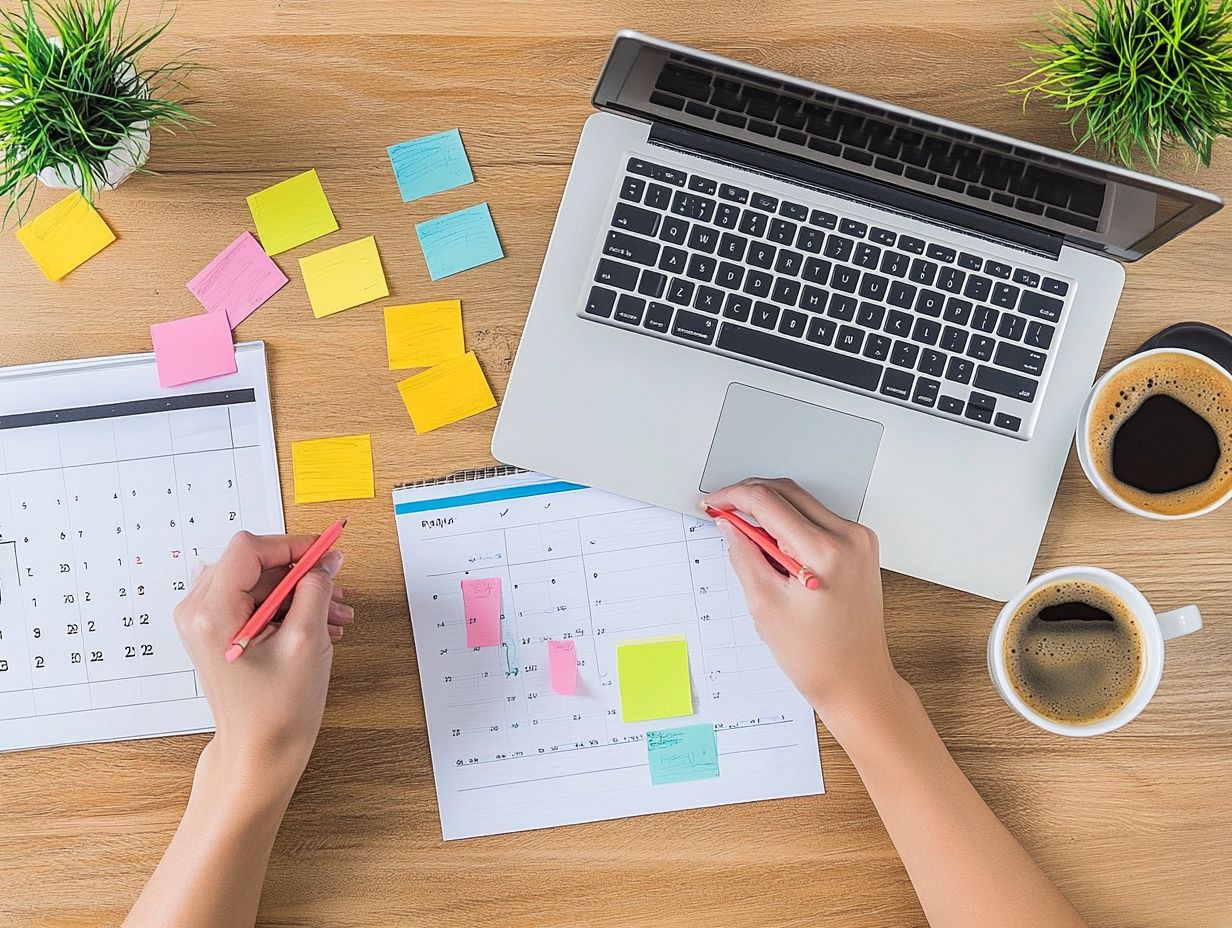How to Use Feedback to Overcome Procrastination
Procrastination can often envelop you in an endless cycle, ensnaring you in a loop of inaction. To break free from this habit, it s crucial to understand this feedback loop.
Get ready to dive into the various types of feedback both internal and external that can effectively combat procrastination. You ll discover the power of positive reinforcement, the benefits of constructive criticism, and the significance of establishing an accountability system.
We also provide insights on overcoming the fear of feedback, empowering you to embrace growth and productivity. Discover powerful strategies now that will change how you tackle tasks and drive you toward your goals!
Contents
- Key Takeaways:
- The Procrastination Feedback Loop
- Types of Feedback for Overcoming Procrastination
- Using Positive Reinforcement
- Identifying and Celebrating Small Wins
- Seeking Constructive Criticism
- Creating an Accountability System
- Overcoming Fear of Feedback
- Conclusion
- Frequently Asked Questions
- 1. How can I use feedback to overcome procrastination?
- 2. Why is feedback important in overcoming procrastination?
- 3. How do I gather feedback to help me overcome procrastination?
- 4. Can feedback be harmful in overcoming procrastination?
- 5. How can I use feedback as a way to reflect on overcoming procrastination?
- 6. What should I do if I receive negative feedback while trying to overcome procrastination?
Key Takeaways:

- Understand the cycle of procrastination to break the feedback loop.
- Utilize both internal and external feedback to overcome procrastination.
- Celebrate small wins and seek constructive criticism to improve productivity.
The Procrastination Feedback Loop
The procrastination feedback loop is a cyclical pattern that many individuals find themselves ensnared in. They grapple with the challenge of managing time effectively and prioritizing tasks. This struggle often escalates feelings of stress and anxiety, ultimately hindering your progress toward specific goals and diminishing overall productivity.
Gaining insight into this loop is crucial for breaking the habit of procrastination. By fostering understanding yourself better and implementing effective strategies such as accountability and feedback mechanisms you can enhance your emotional well-being and reclaim control over your time.
Understanding the Cycle of Procrastination
Understanding the cycle of procrastination is essential for anyone looking to refine their time management skills and reach personal goals.
By diving into this cycle, you can uncover how the various stages interact to obstruct your progress. Initially, distractions whether they arise from technology or your surroundings can easily pull your focus away, sapping your motivation. This distraction leads to an uphill battle, as you grapple with feelings of guilt and anxiety over tasks left unfinished. Such emotional strain can further undermine your self-regulation, making it even more challenging to regain your momentum.
To fight these habits, embrace effective productivity techniques. For instance, breaking tasks into smaller, manageable segments can significantly boost your emotional well-being, enabling you to achieve more and foster a greater sense of control throughout your day.
Types of Feedback for Overcoming Procrastination
Various forms of feedback can be helpful in overcoming procrastination, but learning how to use mind mapping to stop procrastination can further enhance self-awareness and cultivate accountability, all of which are essential for your personal and professional development.
Internal and External Feedback
Internal and external feedback can have a strong effect on your ability to manage procrastination and enhance your productivity, especially when you recognize the power of accountability in overcoming procrastination.
Grasping the distinction between these two types of feedback is essential for your personal growth. Internal feedback is all about the self-reflection and self-critique you engage in, while external feedback comes from others think peers or mentors. When you receive external feedback, it often instills a sense of accountability, motivating you to stay committed to your tasks. This collaborative effort fosters a supportive environment that effectively combats procrastination.
On the flip side, internal feedback nurtures self-awareness, helping you identify the triggers that lead to delays. By actively engaging with both types of feedback, you can significantly boost your task completion and gain a deeper understanding of your work habits.
Using Positive Reinforcement

Employing positive reinforcement is a highly effective strategy for combating procrastination, boosting motivation, and enhancing overall productivity in both your personal and professional life.
Identifying and Celebrating Small Wins
Celebrate your small wins! They can supercharge your motivation and emotional well-being, serving as powerful strategies to curb procrastination.
By acknowledging these incremental achievements, you create a positive feedback loop that reinforces your drive to tackle larger tasks. This practice enhances your productivity, as each small success acts as a stepping stone.
Nurturing a sense of accomplishment gives you the power to forge ahead. Recognizing these wins can help alleviate feelings of overwhelm and counter the paralyzing grip of procrastination.
Through this process, you cultivate resilience and self-confidence essential components that enrich your emotional health and propel you toward greater achievements in both your personal and professional life.
Seeking Constructive Criticism
Seeking helpful feedback that shows you what to improve is a highly effective strategy if you aim to boost your productivity and gain deeper insights into your procrastination habits, including visualization techniques to beat procrastination.
Embracing feedback helps you grow and identify areas for improvement, ultimately paving the way for a more focused and fulfilling approach to your tasks.
How Feedback Can Help Improve Productivity
Feedback holds immense power in enhancing your productivity by tackling procrastination and promoting self-regulation. For those looking for additional strategies, learning how to use visualization can be an effective way to overcome procrastination.
When you receive constructive insights into your performance, it highlights areas ripe for development, giving you the power to approach your tasks with renewed confidence.
This guidance can significantly ease the stress about doing well that often accompanies daunting assignments, acting as a motivational spark that drives you toward timely completion.
When you know what to improve, you’re less likely to procrastinate. By embracing effective feedback mechanisms, you cultivate accountability and foster a growth mindset the belief that you can improve with effort.
Creating an Accountability System
Establishing an accountability system is crucial for anyone determined to overcome procrastination, refine their time management skills, and elevate overall productivity.
By implementing such a framework, you give yourself the power to stay focused and achieve your goals with greater efficiency.
Using Feedback to Stay on Track

Utilizing feedback effectively can keep you on track and bolster your motivation while managing pesky procrastination tendencies. For more strategies, consider exploring how to use positive reinforcement to combat procrastination.
When you embrace feedback as a constructive tool, you cultivate accountability that aligns seamlessly with your goals.
Actively seeking insights from peers or mentors helps you maintain task prioritization and enhances your emotional well-being, as you feel supported in your endeavors.
This practice nudges you to reflect on your progress and pinpoint areas for improvement, ultimately honing your time management skills.
By integrating actionable feedback, you can carve out a clearer roadmap for success, diminish the overwhelm often tied to complex tasks, and foster a more proactive approach to achieving your long-term aspirations.
Overcoming Fear of Feedback
Overcoming the fear of feedback is an essential milestone in your pursuit of personal growth and using gamification to overcome procrastination effectively.
Embracing constructive criticism not only gives power to your journey but also enhances your ability to take decisive action.
Conclusion
Don’t wait! Start seeking feedback today to unlock your potential and implement these strategies now.
Tips for Embracing Feedback and Growth
Embracing feedback is vital for your personal growth and a powerful antidote to procrastination, as it nurtures self-awareness and emotional well-being.
By actively seeking constructive criticism, you can uncover blind spots in your performance and behavior. This openness to others’ perspectives sharpens your skills and fortifies your resilience against setbacks.
For those wrestling with procrastination, reframing feedback is essential. Rather than viewing suggestions as negative judgments, consider them as valuable insights that can propel you forward. Additionally, learning how to use positive visualization to beat procrastination can further enhance your motivation and focus.
Having an open attitude towards different opinions can transform uncomfortable moments into powerful opportunities for improvement, empowering you to take action instead of putting tasks on the back burner.
Frequently Asked Questions
1. How can I use feedback to overcome procrastination?
One way to use feedback to overcome procrastination is to set specific and achievable goals for yourself. This will give you clear direction and allow you to track your progress. Additionally, learning how to use rewards to fight procrastination can further enhance your motivation.
2. Why is feedback important in overcoming procrastination?

Feedback can provide valuable insights into your progress and highlight areas where you might need to improve. It can also motivate you to stay on track and hold you accountable for your actions.
3. How do I gather feedback to help me overcome procrastination?
You can gather feedback from various sources such as colleagues, mentors, or even through self-reflection. Embrace constructive criticism as a powerful tool for growth!
4. Can feedback be harmful in overcoming procrastination?
If you only focus on negative feedback, it can be harmful and discourage you from making progress. Balance both positive and negative feedback and use them as learning opportunities.
5. How can I use feedback as a way to reflect on overcoming procrastination?
Feedback can help you reflect on your actions and identify patterns or habits that may be contributing to your procrastination. Understanding the role of reflection in overcoming procrastination can empower you to create a plan of action to tackle these obstacles.
6. What should I do if I receive negative feedback while trying to overcome procrastination?
Instead of getting discouraged, use negative feedback as a learning opportunity. Identify the areas that need improvement and create a plan to address them. Remember, progress is not always linear, and setbacks are a natural part of the process.






